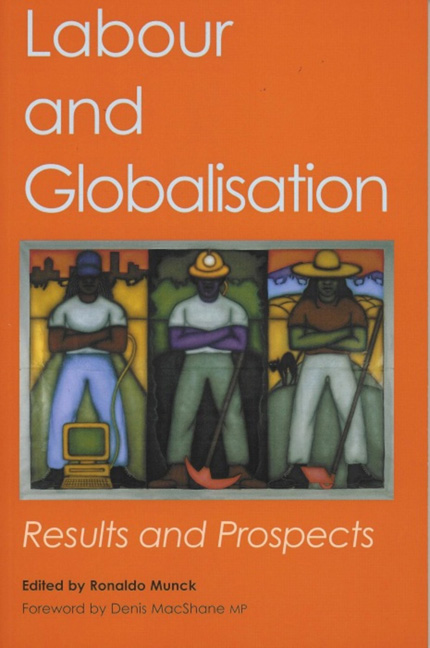Book contents
- Frontmatter
- Contents
- Acknowledgements
- Foreword
- Notes on the Contributors
- List of Abbreviations
- Introduction: Globalisation and Labour Transnationalism
- Part I Global Dimensions
- Part II Spatial Dimensions
- 5 Re-Scaling Trade Union Organisation: Lessons from the European Front Line
- 6 Australia and Beyond: Targeting Rio Tinto
- 7 International Solidarity and Labour in South Africa
- 8 Labour and NAFTA: Nationalist Reflexes and Transnational Imperatives in North America, 1991–1995
- Part III Social Dimensions
- Index
7 - International Solidarity and Labour in South Africa
from Part II - Spatial Dimensions
- Frontmatter
- Contents
- Acknowledgements
- Foreword
- Notes on the Contributors
- List of Abbreviations
- Introduction: Globalisation and Labour Transnationalism
- Part I Global Dimensions
- Part II Spatial Dimensions
- 5 Re-Scaling Trade Union Organisation: Lessons from the European Front Line
- 6 Australia and Beyond: Targeting Rio Tinto
- 7 International Solidarity and Labour in South Africa
- 8 Labour and NAFTA: Nationalist Reflexes and Transnational Imperatives in North America, 1991–1995
- Part III Social Dimensions
- Index
Summary
Globalisation is associated with the increased reliance on the regulation of economic relations by markets. National governments turn to neo-liberal approaches to macro-economic management, implying privatisation, monetary liberalisation, a reduction in import tariffs, labour market flexibilisation and fiscal discipline. Countries are also becoming more interconnected as trade barriers between them are dismantled. India reduced its average import tariffs from 82 per cent in 1990 to 30 per cent in 1997, Brazil from 25 per cent in 1991 to 12 per cent in 1997, and China from 43 per cent in 1992 to 18 per cent in 1997 (UNDP, 1999: 29). Likewise, South Africa reduced its average import tariffs on manufactured goods from 14 per cent in 1994 to 5.6 per cent in 1998 (ILO, 1997: 76). This puts workers in different countries in competition with each other, which opens up the prospect of a ‘levelling downwards’ in wages and working conditions.
The flow of money between countries has also increased. Foreign direct investment grew to US$400 billion in 1997, seven times what it was in real terms in the 1970s. Goods exported now average a value of US$7 trillion. Also, transnational corporations (TNCs) have been growing at a rapid pace. In 1990, there were 11,300 mergers and acquisitions. In 1997, this number more than doubled to 24,600. In 1997 alone, US$236 billion was spent in cross-border mergers and acquisitions. Many TNCs now have annual sales totalling more than the gross domestic product of many countries, including South Africa (UNDP, 1999: 31–32).
As workers across the globe are becoming increasingly interconnected, either through common employers, or through the threat of factories relocating to areas where labour is docile and cheap, trade unions have increasingly become aware of the need for a different approach to campaigns. Certain recent events, such as the involvement of the International Confederation of Free Trade Unions (ICFTU) in the controversial social clause campaigns during the 1999 Seattle talks of the World Trade Organisation (WTO), have all indicated that there is an increased realisation among organised labour that merely national responses to globalisation are not adequate (Taylor, 1998).
- Type
- Chapter
- Information
- Labour and GlobalisationResults and Prospects, pp. 128 - 148Publisher: Liverpool University PressPrint publication year: 2003



